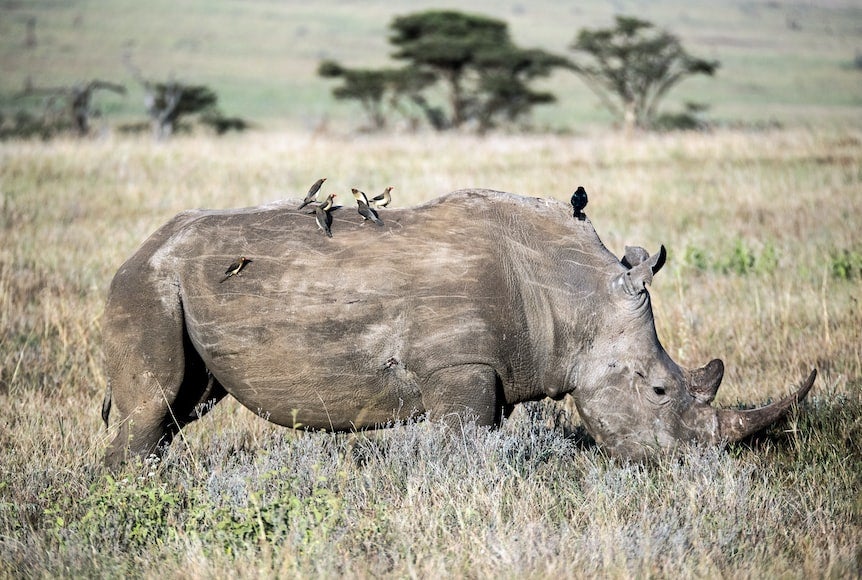Was a rhino killed in Botswana’s Khama Rhino Sanctuary?
Officials deny the multiple reports that a white rhino was killed and dehorned within the sanctuary’s borders

A white rhino has reportedly been killed and dehorned by poachers inside the protected Khama Rhino Sanctuary (KRS) in Botswana, which has celebrated years of avoiding the scourge of the illegal wildlife trade.
Two separate conservationists have reported on the killing. One conservationist told this publication that their sources inside the Department of Wildlife and National Parks (DWNP) confirmed the incident.
“Two weeks ago a white rhino was poached at Khama Rhino Sanctuary. They are denying it happened at their property but sources inside DWNP confirm it was indeed at KRS.”
Another conservationist, Oscar Nkala, wrote on his Instagram account: “Nobody will confirm that poachers killed and dehorned a rhino at the Khama Rhino Sanctuary because government policy in Botswana is to see nothing and hear nothing about poaching. I don’t know whether this is done for the good of conservation or to massage the egos of the politicians.”
Nkala shared graphic pictures (The Telegraph can’t confirm the authenticity of the images) of a dehorned white rhino claiming that is what the rhino looked like after the poachers were done with it.
“Botswana now tolerates poaching to the point of not worrying even when it happens in a supposedly safe location like the Khama Rhino Sanctuary.”
Speaking to this publication following the reports KRS Chief Warden, Thapelo Baiphethi, denied any knowledge of a poaching incident within the park. He said the Botswana Defense Force (BDF) were the ones providing protection around the sanctuary and they were the ones who would inform him of such an incident.
“As of now I have not been informed of any incident involving poachers within our perimeters,” KRS Chief Warren said in a telephone interview.
Attempts to get a comment from the DWNP drew a blank as the director, Dr. Kabelo Senyatso, did not respond to our inquiry.
KRS is a community-based wildlife project, established in 1992 to assist in saving the vanishing rhinoceros. Covering approximately 8,585 hectares of Kalahari sand veld, the sanctuary provides prime habitat for white and black rhino as well as over 30 other animal species and more than 230 species of birds.
Botswana’s government has for the past few years been cagey about cases of rhino poaching, choosing to respond or counter leaks from conservationists and DWNP game rangers.
The fight against rhino poaching has, since 2018, been overshadowed by political posturing. It has since become a source of publicity war between President Mokgweetsi Masisi and his predecessor and staunch conservationist Ian Khama.
Poaching rose by more than 100 percent since Khama left office in April 2018, raising questions about his successor’s commitment to wildlife conservation.
President Masisi’s disarmament of the DWNP’s anti-poaching unit in 2018 was widely seen as the reason behind the sudden rise in poaching incidences. Over 100 rhinos were killed and dehorned in the two years since he took office in 2018 as compared to the one rhino killed in the preceding two years of Khama’s administration.
A recent report by the UK's Environmental Investigation Agency (EIA) condemned the Botswana government’s anti-rhino poaching efforts. The document ‘The Rise of Rhinoceros Poaching in Botswana’ released earlier this year, accused Botswana of being reluctant to work with other governments and civil society to address poaching. It said allegations of corruption have further called into question Botswana’s ability to protect its rhino population from poaching and illegal trade.
DWNP director Dr. Senyatso however called the document inaccurate and misleading. “This is a misguided and misinformed position by the Environmental Investigation Agency,” Senyatso told this publication recently. “Botswana’s law enforcement agencies, under the ambits on the National Anti-poaching Strategy (NAPS), have a myriad of proactive approaches, including intelligence-led strategic, operational and tactical interventions,” he said.
This article is reproduced here as part of the African Conservation Journalism Programme, funded in Angola, Botswana, Mozambique, and Zimbabwe by USAID’s VukaNow: Activity. Implemented by the international conservation organization Space for Giants, it aims to expand the reach of conservation and environmental journalism in Africa, and bring more African voices into the international conservation debate.
Read the original story here
Join our commenting forum
Join thought-provoking conversations, follow other Independent readers and see their replies
Comments
Bookmark popover
Removed from bookmarks